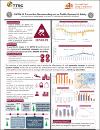COVID-19 Preventive Measures Impact on Traffic Demand & Safety
Date
2020Metadata
Show full item recordAbstract
COVID-19 has affected the mobility of people significantly due to movement restrictions imposed by government authorities to control the spread of the pandemic. The staged movement restrictions that have been implemented by the government authorities to curb the spread of the disease included the closure of educational institutions and adopt online-based education, restrict commercial activities, and reducing the number of employees at the workplace. This paper presents the impact of these mitigation policies on the traffic volumes, the number of traffic violations, and the number of crashes in the State of Qatar. The hourly distribution of traffic volume showed similar trends before and after the implementation of these policies. Overall, the total traffic decreased by 30% compared to baseline conditions for all selected intersections as well as the Central Business District (CBD) screenline after the implementation of all measures. From the safety perspective, the total traffic violations decreased by 73% in April and May when the restrictions due to all three policies were imposed. During the same time, a decrease of 42% to 54%, 20% to 54%, and around 36% was observed for traffic crashes involving deaths, major loss, and minor damages respectively. Similarly, the total traffic crashes declined by 37% when complete restrictions were in place and COVID-19 was in peak stage. The results of this study will help policymakers and planners to plan/manage the traffic operations in the future during any emergencies. The results can be applied also while managing traffic during the post-covid era, special and mega-events for temporary traffic management based on real-life data
DOI/handle
http://hdl.handle.net/10576/16526Collections
- COVID-19 Research [924 items ]
- Theme 5: Covid-19 Research [32 items ]


